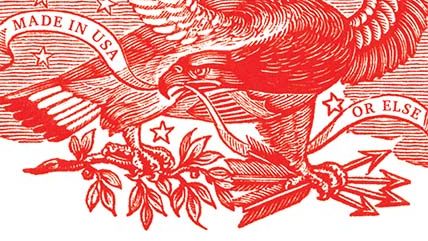Meet the Free Traders Who Don't Like Global Trade Agreements
Trump's unusual fusionism puts anti-WTO libertarians on the spot.

Donald Trump campaigned more vigorously for tariffs and against trade agreements than any major-party nominee, Democrat or Republican, since at least World War II. In setting his sights on the postwar trading order, the 45th president is being bolstered by an unusual bloc of supporters: free traders against trade agreements.
During the campaign, Trump called the North American Free Trade Agreement "one of the worst economic deals ever made by our country." In early December, the president-elect promised "retribution," including a "tax on our soon to be strong border of 35%," directed at "any business that leaves our country for another country, fires its employees, builds a new factory or plant in the other country, and then thinks it will sell its product back into the U.S." Rep. Justin Amash (R–Mich.), arguably one of the two most libertarian members of Congress, reacted as you might expect: with a cutting tweet. "This would be a 35% tax on all Americans—a tax that especially hurts low-income families," he wrote on the platform. "Maybe the slogan should be #MakeAmericaVenezuela."
But that second congressional libertarian, Rep. Thomas Massie (R–Ky.), reacted quite differently. "Bilateral trade agreements are a wonderful thing," Massie tweeted at me, after I criticized the new GOP positioning on tariffs. "Global government, not so much."
Libertarians have long been sensitive to the paradox near the heart of international tariff-reduction projects of the past seven decades. On one hand, increasingly free global trade flows have irrefutably played an outsized role in lifting a billion people out of poverty in the last quarter-century alone. On the other, multilateral trade agreements by definition create institutions, such as the World Trade Organization (WTO), beyond the direct reach of sovereign democratic polities.
Those of us who have accepted that trade-off have found ourselves for decades having to both defend and try to improve from within the "Washington consensus" on liberalizing tariffs. But now that that consensus has been repudiated at the polls all over the Western world, it's time for the other side of that intra-libertarian argument to make its free trade case within an imperfect vessel.
Take Daniel Hannan. Before and after the United Kingdom's historic vote to exit the European Union, Hannan, one of the most articulate defenders of global free trade you will ever hear speak, defended "Brexit" as a corrective exercise in recapturing national sovereignty. "All of the polls were very clear that the biggest issue was democracy. Immigration was a very distant second," Hannan told Reason's Nick Gillespie in November. "People wanted a sense of control and I think that's a perfectly legitimate thing." At a Reason Foundation event the same month, Hannan said he's interested in starting up an organization to promote a true free trade deal between Washington and London.
And yet the nationalists Hannan hitched his wagon to do not share his views on government intervention into markets. Brexit leader Boris Johnson complained during the campaign that "when we want to change tack on tariffs, we can't—because we have given up control." Now that Johnson et al. have resumed control, one of the paradoxes they're grappling with is that a replacement trade agreement with the E.U. could take as long as a decade to hammer through. Nationalism and tariff reductions are not a natural mix, turns out.
Donald Trump knows this very well. At press time, the president-elect was floating a broad-based 5 percent import tax, which would, in addition to directly reducing the purchasing power of Americans, pose legal challenges to just about every trade deal the U.S. has signed. What's more, Trump's politicking on the issue appears to be changing public opinion: A remarkable 73 percent of Republicans, according to a December Economist/YouGov poll, approve of "imposing stiff tariffs or other taxes on U.S. companies that relocate jobs."
Thus far Trump's political success has prompted longtime free-traders, such as Vice President–elect Mike Pence and Club for Growth co-founder Steve Moore, to change their spots on the issue. Others, including House Majority Leader Kevin McCarthy (who told reporters "I don't want to get into some type of trade war"), appear to be holding the line.
So the ball's in your court, Thomas Massie, Daniel Hannan, Ron Paul, and all the other libertarians who have argued for years that free trade agreements aren't the same thing as free trade. The postwar liberal trade order certainly has had its defects. Here's hoping the additional sovereignty won't come with an untenably protectionist price tag.
This article originally appeared in print under the headline "Meet the Free Traders Who Don't Like Global Trade Agreements."


Show Comments (30)